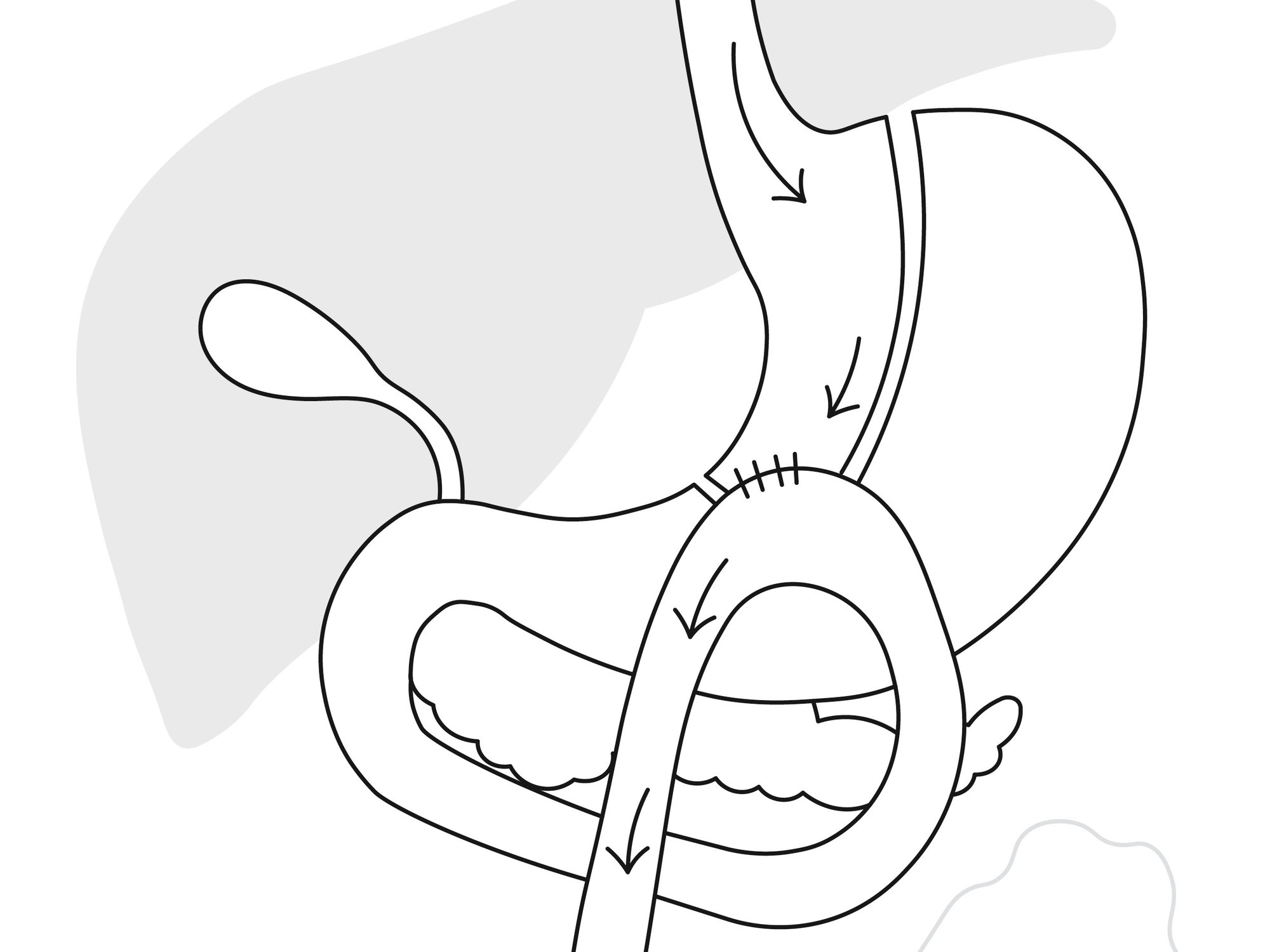FitForMe is trusted by 200,000+ customers and 8000+ healthcare professionals
FitForMe is trusted by 200,000+ customers and 8000+ healthcare professionals

Trustpilot score: 4.4 out of 5
What is a Mini Gastric Bypass and why do you need extra vitamins afterward? Find out here.
What is a Mini Gastric Bypass?
A Mini Gastric Bypass is a procedure where your stomach is made smaller. Your stomach takes the shape of a narrow tube (pouch). The surgeon also creates a bypass in your intestines. The pouch is connected to the lower part of your small intestine. A Mini Gastric Bypass is also called One Anastomosis Gastric Bypass or Omega Loop Gastric Bypass.
Due to the stomach reduction and intestinal bypass, you must eat much less. That way, you lose weight. A Mini Gastric Bypass is therefore an effective treatment for severe obesity. It helps you to get fit quickly.
The shape of your stomach
With a Mini Gastric Bypass, your stomach has the size and shape of a small banana. With a Gastric Bypass, your stomach has the shape and size of a kiwi.
New connection in your intestines
With a Mini Gastric Bypass, the surgeon makes 1 new connection between your stomach and small intestine. With a Gastric Bypass, there are 2 new connections.
Who is a suitable Mini Gastric Bypass recipient?
- You have a BMI higher than 30*
- Previous weight loss methods have not been successful
- Your doctor believes a Mini Gastric Bypass is the best solution for you
After surgery, your stomach is about the size of a small banana. This means you can only eat small portions.


What is the recovery process of a Mini Gastric Bypass?
A Mini Gastric Bypass, also known as an Omega Loop Gastric Bypass, is a stomach surgery done under anaesthesia. This can be very taxing on your body. Getting enough rest after the procedure helps to ensure the quickest recovery. On average, recovery from a Mini Gastric Bypass takes 3 to 6 weeks. During this time, it is important to follow the advice of your doctor.
This timeline is an indication of recovery from a Mini Gastric Bypass. The exact length and how it progresses varies from person to person. Your doctor can tell you more about this.
- Surgery
- 1 week: you can drive, walk and cycle cautiously again
- 2 weeks: you can eat solid food again
- 6 weeks: you can lift and exercise cautiously again
The pros and cons of a Mini Gastric Bypass
✔ You usually lose 75-80 % of your excess weight, which makes you feel fitter.
✔ Because you produce less ghrelin and leptin is improved, you have less hunger.
✔ Problems with your blood sugar decrease or disappear.
✔ Unpleasant consequences of your excess weight decrease or disappear.
✔ Health and quality of life improve, according to 95 % of people with a Gastric Sleeve.**
✗ Because you eat less, you lose weight. But eating less also means you get fewer vitamins and minerals. Deficiencies can lead to problems.
✗ Food intolerances may (temporarily) occur. This usually applies to meat, dairy, bread, and pasta.
✗ Most people with a Mini Gastric Bypass do not lose all their excess weight. Your healthy lifestyle, mindset, and nutrition are essential to losing weight permanently and feeling fit.
✗ No surgery is without risk. This also applies to a Mini Gastric Bypass.
Why do you need extra vitamins and minerals after a Mini Gastric Bypass?
After a Mini Gastric Bypass, your body takes up fewer vitamins and minerals. This is because the first part of the small intestine is closed off from food, and because your stomach produces less gastric acid to absorb nutrients. Vitamins and minerals are important to feel good and stay healthy.
In addition, after your Mini Gastric Bypass, you may not be able to tolerate certain foods (temporarily). These are mainly:
- Meat: source of protein, vitamin B12, and iron.
- Dairy: source of calcium.
- Bread and pasta: source of fibre.
Why do you need extra vitamins and minerals after a Mini Gastric Bypass?
After a Mini Gastric Bypass, your body takes up fewer vitamins and minerals. This is because the first part of the small intestine is closed off from food, and because your stomach produces less gastric acid to absorb nutrients. Vitamins and minerals are important to feel good and stay healthy.
In addition, after your Mini Gastric Bypass, you may not be able to tolerate certain foods (temporarily). These are mainly:
- Meat: source of protein, vitamin B12, and iron.
- Dairy: source of calcium.
- Bread and pasta: source of fibre.
If you have a vitamin or mineral deficiency, your body won't show signs of this right away. Eventually, you may have less energy or feel down more often. Hair loss can also be experienced. A Mini Gastric Bypass means choosing a healthier life, now and in the future. Taking a multivitamin makes this easier for you, day after day.
We'll be honest: a multivitamin isn't a super pill that will make you healthy in no time. It's your daily support to prevent deficiencies, especially after surgery when your body absorbs fewer vitamins and minerals. Through scientific research, we understand which nutrients your body needs after a Mini Gastric Bypass. We have combined these important vitamins and minerals into 1 multivitamin.
- Scientifically proven effective
- Tailored to your surgery
- Easy capsule
- Make maintaining a healthy lifestyle easier
Here's how we help you find more balance
A Mini Gastric Bypass is a major decision. We understand that. That's why we support you with scientifically based multivitamins, advice, and a listening ear. We make it as smooth as possible for you. We deliver your multivitamins to your home when it suits you. So you can stay in balance easily. Today, tomorrow, and for a lifetime.
- Continuous scientific research
- Stay healthy the easy way with your Subscription
- Worldwide free home delivery
- Personal advice from our dieticians
FitForMe is here for you
Taking a daily multivitamin tailored to your surgery contributes to your health, not only before and after the procedure, but for life. With a Mini Gastric Bypass, you have taken your first step towards a healthy lifestyle. We are here to support you on your brave journey.

”I was always skeptical about using nutritional supplements, but after a medical procedure, it was highly recommended by the specialist. FitForMe has helped to ensure that my values are always good. Furthermore, it is nice that FitForMe always restocks on time. I am glad that I chose them.”

FitForMe Customer

”After my weight loss surgery, I came in contact with FitForMe. They helped me to take the right supplements. I feel great!”

FitForMe Customer
Disclaimer
Supplements are an addition to your diet. Choose healthy and varied food and get enough exercise. Do not exceed the recommended dose. Do not use this product unless you have had a Mini Gastric Bypass and are 18 years or older. Are you pregnant or breastfeeding? Then you can use WLS Primo.
* A BMI higher than 30 with accompanying health complaints, or a BMI higher than 35 without accompanying health complaints.
** Source: https://pubmed.ncbi.nlm.nih.gov/17128540/














